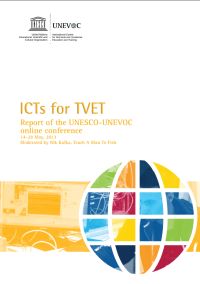
The UNESCO-UNEVOC International Centre: Who We Are | What We Do | Working With Us | Get in Touch
The UNEVOC Network: Learn About the Network | UNEVOC Network Directory
For Members: UNEVOC Centre Dashboard
Thematic Areas: Inclusion and Youth | Digital Transformation | Private Sector Engagement | SDGs and Greening TVET
Our Key Programmes & Projects: BILT: Bridging Innovation and Learning in TVET | Building TVET resilience | TVET Leadership Programme | WYSD: World Youth Skills Day
Past Activities: COVID-19 response | i-hubs project | TVET Global Forums | Virtual Conferences | YEM Knowledge Portal
Our Services & Resources: Publications | TVET Forum | TVET Country Profiles | TVETipedia Glossary | Innovative and Promising Practices | Toolkits for TVET Providers | Entrepreneurial Learning Guide
Events: Major TVET Events | UNEVOC Network News
 "What are the implications of the ICT revolution for Technical and Vocational Education and Training?" This question attracted 247 participants from 74 countries to come together online for 2 weeks on the UNEVOC e-Forum, and some of them also joined a one-hour live conference and thought of ways to share promising practices to improve access to vocational education as well as quality.
"What are the implications of the ICT revolution for Technical and Vocational Education and Training?" This question attracted 247 participants from 74 countries to come together online for 2 weeks on the UNEVOC e-Forum, and some of them also joined a one-hour live conference and thought of ways to share promising practices to improve access to vocational education as well as quality.
The virtual conference, organized by the UNESCO-UNEVOC International Centre for TVET (Bonn, Germany) from 14 to 28 May 2013 was moderated by Nik Kafka, CEO and founder of Teach A Man to Fish![]() , an international non-governmental organization supporting schools across the developing world, and aimed at opening up dialogue and facilitate the sharing of promising practices on integrating ICTs into TVET. The conversations focused on identifying what ICTs can do to enhance the reach and impact of TVET; which tools are available and how they improve learning outcomes; what ICT skills should young people have to enhance their employability; and which are the common challenges faced by TVET providers, teachers and policy makers in widening access to ICT in all regions of the world.
, an international non-governmental organization supporting schools across the developing world, and aimed at opening up dialogue and facilitate the sharing of promising practices on integrating ICTs into TVET. The conversations focused on identifying what ICTs can do to enhance the reach and impact of TVET; which tools are available and how they improve learning outcomes; what ICT skills should young people have to enhance their employability; and which are the common challenges faced by TVET providers, teachers and policy makers in widening access to ICT in all regions of the world.
The virtual conference highlighted that ICTs can greatly contribute to improving the quality of education if used appropriately and has the potential to not only enhance people’s technical skills, but also helps to develop ‘transferrable’ or soft skills supporting lifelong learning. Participants expressed how ICTs in TVET can also enhance the perception of TVET, a form of education that is often regarded as second-class. The discussion further highlighted the need for a flexible and blended approach in incorporating ICTs into TVET, recognizing the crucial role of the teacher in its delivery. Concerns were raised that teachers may not always be prepared to use ICTs in their teaching. Participants recommended investing in on-going training and support for teachers and instructors to ensure the optimal use of ICT tools. Similarly, it was raised that teachers and students should be encouraged to share knowledge and resources online to boost the quality and availability of open educational resources (OER). Concerns were raised that if not addressed appropriately, the ‘digital divide’ is likely to widen, thus deepening existing inequalities. Participants from different parts of the world advocated for reducing the digital divide by providing basic literacy training and involving local communities in utilizing ICT in education. The challenge is to make sure the tools are inclusive and adapted to the local context, recognizing limitations in terms of access and quality.
Links
Read the full report
Read all contributions
Watch the introduction video![]()